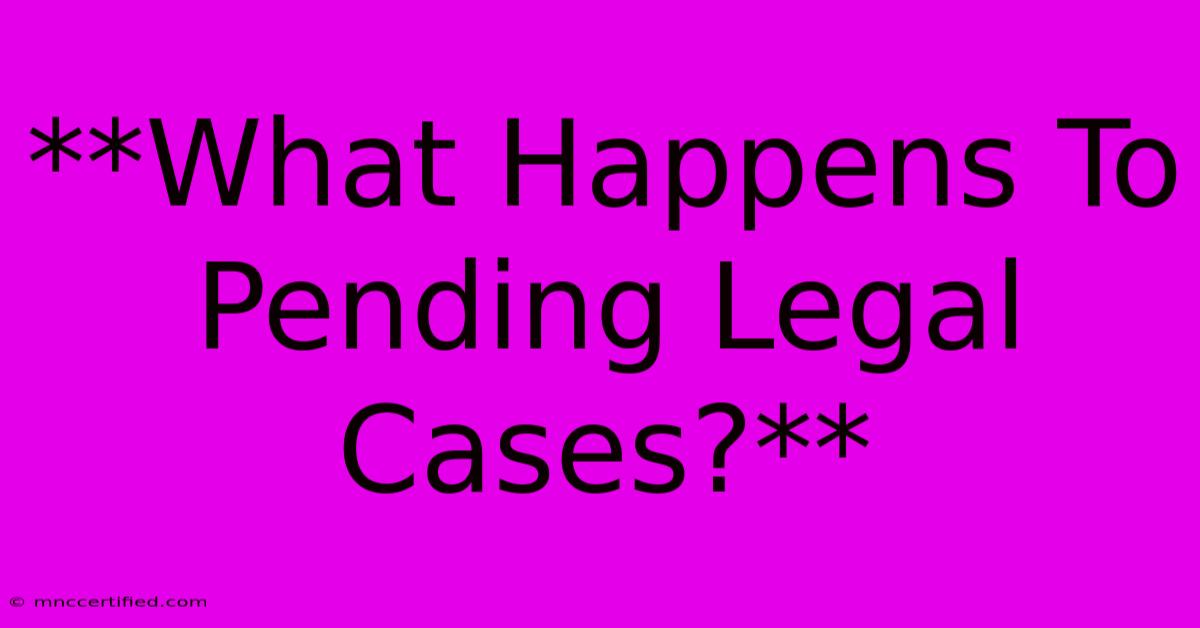**What Happens To Pending Legal Cases?**

Table of Contents
What Happens to Pending Legal Cases? A Guide to the Legal Process
Navigating the legal system can be confusing, especially when you have a pending case. You might be wondering, "What happens next? How long will this take? What are the possible outcomes?" This guide will break down the typical stages of a pending legal case, providing clarity and insights into what you can expect.
Understanding the Stages of a Legal Case
The journey of a legal case involves several distinct stages, each with its own set of procedures and timelines. Here's a simplified breakdown:
1. Pleadings and Discovery:
- Filing the Complaint: This is the initial step, where the plaintiff (the party bringing the lawsuit) formally outlines their claims against the defendant.
- Answer and Counterclaims: The defendant responds to the complaint, admitting or denying the allegations and potentially raising counterclaims against the plaintiff.
- Discovery: This phase involves gathering information from both parties to build their cases. Common discovery tools include depositions, interrogatories, and document requests.
2. Motions and Pre-Trial Conferences:
- Motions: Parties can file motions to dismiss the case, for summary judgment, or for other relief.
- Pre-Trial Conferences: These meetings involve the judge and attorneys to discuss case progress, potential settlements, and trial scheduling.
3. Trial:
- Jury Selection: A jury (if applicable) is selected from a pool of potential jurors.
- Opening Statements: Attorneys present their cases and outline the evidence they intend to present.
- Presentation of Evidence: Witnesses are called, documents are presented, and evidence is examined.
- Closing Arguments: Attorneys summarize their arguments and urge the jury (or judge) to find in their favor.
- Jury Deliberations: The jury (or judge) considers the evidence and reaches a verdict.
4. Post-Trial Proceedings:
- Judgment: The court issues a final ruling based on the verdict.
- Appeals: If either party disagrees with the judgment, they can appeal the decision to a higher court.
- Enforcement: The winning party can seek to enforce the judgment, such as collecting damages or obtaining specific performance.
Factors Affecting Case Duration and Outcomes
The length and outcome of a legal case are influenced by several factors:
- Complexity of the Case: Cases involving intricate legal issues or a vast amount of evidence can take longer.
- Number of Parties: Cases with multiple plaintiffs or defendants can complicate proceedings.
- Availability of Resources: Parties with access to more resources, like expert witnesses or extensive legal teams, can potentially influence the case's direction.
- Settlement Negotiations: Many cases are resolved through settlements before trial, which can significantly shorten the process.
- Court Backlog: Courts with large caseloads can contribute to delays in scheduling hearings and trials.
Staying Informed and Engaged
It's crucial to stay informed and engaged throughout the legal process. Here are some helpful steps:
- Communicate with Your Attorney: Regularly discuss your case with your attorney and ask questions about any aspect you don't understand.
- Attend Hearings and Trials: Participate in court proceedings to gain insights into how the case is progressing.
- Keep Detailed Records: Maintain records of all communications, documents, and significant events related to your case.
- Explore Alternatives to Litigation: Consider mediation or arbitration to resolve disputes outside of court.
Seeking Legal Advice
Remember that this information is for general guidance only and does not constitute legal advice. If you have a pending legal case, it's crucial to consult with an experienced attorney who can provide tailored advice specific to your situation.

Thank you for visiting our website wich cover about **What Happens To Pending Legal Cases?** . We hope the information provided has been useful to you. Feel free to contact us if you have any questions or need further assistance. See you next time and dont miss to bookmark.
Featured Posts
-
Is Chiropractor Covered By Insurance Cigna
Nov 07, 2024
-
Washington Lieutenant Governor Election 2024 Results
Nov 07, 2024
-
Meet Jd Vance Trumps Vp Pick
Nov 07, 2024
-
Insurance Defense Attorney Job Description
Nov 07, 2024
-
Election Map Trump Wins 2020
Nov 07, 2024